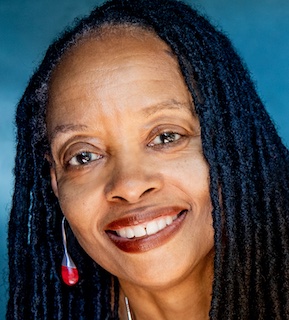
Valerie Boyd is a professor of journalism and the Charlayne Hunter-Gault Distinguished Writer in Residence at the University of Georgia, where she founded and directs the low-residency MFA Program in Narrative Nonfiction. She is author of the critically acclaimed Wrapped in Rainbows: The Life of Zora Neale Hurston, which was hailed by Alice Walker as “magnificent” and “extraordinary”; by The Boston Globe as “elegant and exhilarating”; and by The Denver Post as “a rich, rich read.” Formerly arts editor at The Atlanta Journal-Constitution, Valerie has written articles, essays and reviews for The Washington Post, The Los Angeles Times, Bon Appetit, Creative Nonfiction, The Oxford American, Essence and Atlanta Magazine, among other publications. She is currently senior consulting editor for The Bitter Southerner magazine. Valerie has spent the past several years curating and editing a collection of the personal journals of Pulitzer Prize-winning author Alice Walker. “Gathering Blossoms Under Fire: The Journals of Alice Walker” will be published by Simon & Schuster in 2022. Valerie’s edited collection, “Bigger Than Bravery: Black Writers on the Pandemic, Shutdown and Uprising of 2020,” also will be published in 2022.
What is the most important lesson you’ve learned as a writer?
The most important lesson I’ve learned as a storyteller—as both a writer and an editor—is to be quiet enough to let others speak. Even if I am the narrator, or the lead storyteller, every character has a story, every person in the room has a voice—and every story deserves space to unfurl, every voice deserves a listener. My job is to listen, to amplify, to synthesize, to distill.
What has been the biggest surprise of your writing life?
The biggest surprise of my writing life has been my development as an editor and a teacher of writing, alongside being a writer myself. Writing is often a solitary pursuit, and one stereotype of the writer is that of an isolated, anti-social hermit. A genius perhaps, but still a lonely hermit. Yet I revel in my connections with others and I deeply value collaboration and community. So I have pleasantly surprised myself by fashioning a writing-adjacent career that allows me to preserve my precious solitude as a writer while also calling forth community. In this way, I can be selfish with my writing time and simultaneously generous with my offerings to others as an editor and teacher. For me, this is so gratifying. In 2015, writer/filmmaker/world-changer Ava DuVernay tweeted something that became instantly quotable T-shirt material, and it certainly resonated with me: “If your dream only includes you, it’s too small.”
If you had to use a metaphor to describe yourself as a writer, what would it be and why?
I think of myself as a producer. Whether I’m working as a writer or editor, my role is to bring all the cooperative components together to produce an amazing, moving, memorable show.
What’s the best piece of writing advice anyone ever gave you?
The best piece of writing advice I ever received was also wonderful life advice. I was about to go on my first book tour, and the novelist Tina McElroy Ansa advised: “Always eat breakfast.” A book tour, like a life, can be so unpredictable, she suggested. Who knew if you’d have time to eat along the way? So feed yourself—whatever that may mean for you—before you rush headlong into the day. That advice has resonated with me through huge challenges in my life: If I can just feed myself, first thing, I’ll make it through whatever the day brings.